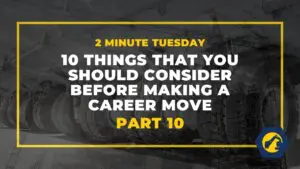If you’ve ever been fishing or even know someone who has, you’ve probably heard the story about “the one that got away.” It goes something like this: You are out fishing and all of a sudden, a fish takes the bait. You jerk back on your rod to set the hook and the tip of your rod arcs toward the water, as you hear the spool of fishingline releasing from the reel because your drag is set low. You know it’s a big fish purely by the force with which it pulls. You may even witness it as it leaps out of the water before spitting your hook or lure out of its gaping mouth, or it may simply snap the line and disappear into the murky water.
It’s a sad story and all too similar to the occasional experience that arises while trying to hire just the right candidates. You have identified someone whom you believe is a perfect fit for the job. You’ve courted them through a thorough interview process, and received their acceptance of a formal offer (a commitment), only to find yourself alone at the altar come their start date. Not only have I personally experienced this story while assisting clients in hiring, it’s one I’ve heard from numerous frustrated hiring managers.
To my knowledge there is not one single thing that you can do to guarantee that the candidate follows through with their commitment to you. However, there arenumerous things that you can do to minimize your risk of losing a great candidate.
Let’s begin with the interview process, wherein covering some key points thoroughly will give you insights into the motivation and behaviors of the candidate.
Understand why they are leaving their current employer.

This is not something to merely skim over.
Ask them to explain it to you in detail, so you can better determine what their motivation is in seeking out a new position.
Secondly, find out what they have done to try to resolve the conflict that has motivated them to look for employment outside of their current employer.
For example, if they believe they are underpaid, have they requested a raise?
If they do not feel like there is room for promotion in a reasonable time frame, have they discussed it with their supervisor?
Too many times I have witnessed a candidate’s issues resolved when they go to their employer with another offer of employment.
Get a Firm Commitment
Getting a firm commitment and start date is important to onboarding candidates. The idea is to get the candidate in a mindset of commitment to you, as if they are already an employee. Let them know that you are counting on them to make a positive impact on the company.
Be mindful of the amount of notice a candidate says they need to give their employer before starting with you. Two weeks seems to be the professional standard in construction. If the candidate is extending their notice longer than that, dig into the details: if you aren’t comfortable with their reasoning, it could be a sign of trouble ahead.
Get the Candidate Engaged and Involved Early
What can you do to get the candidate in the mindset that they are already working for you before they even start? Get them their company laptop, tablet and/or phone quickly. Have then take their drug screen or fill out paperwork shortly after they’ve accepted the position. Send them plans for the first project they will be taking on. Call them and try to involve them in things that relate to their project or role.
Include Their Partner and/or Family In the Interview Process and the Decision
Buy-in of the partner and other family members impacted by the job change is essential to a successful hiring and onboarding. I cannot stress this enough, especially regarding those hirings requiring relocation, how important it is to involve the partner and family in the interview and decision processes. Invite the partner to dinners that other employees’ partners will attend. Question the candidate on what kinds of feedback and thoughts they are getting from their partner, children, or other family regarding them moving forward with the opportunity.
Track and Follow up on the Resignation Process
Talk to the candidate about resigning from their current job and get a full commitment from them before they do so. Without a commitment, the candidate is openly inviting a counteroffer. Advise them on resignation and exit strategies, and try to lock down a specific date from them.
Follow up with them the day after they resign. How did it go? The responses candidates receive usually fall into one of three camps, or a mixture of them.
- We are really sad to see you go, but we support you and would love to have you back if you ever change your mind.
- Pack up your stuff and get out of here.
- What can we do to get you to stay?
Further coaching or advice to help with a smooth transition may need to be addressed at this time to achieve onboarding success.

Maintain Frequent Contact
Last but not least, don’t hire a candidate, then not speak with them for weeks and expect them to show up at your office like they said they would. You’ve come this far, so don’t stop now – reel them in slow and steady all the way to the boat. Maintain frequent contact with them throughout the period prior to them starting at your office. This last step is crucial to decreasing your chances of having your own sad story about “the one that got away.”






